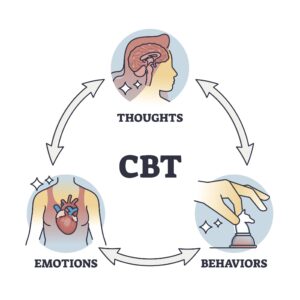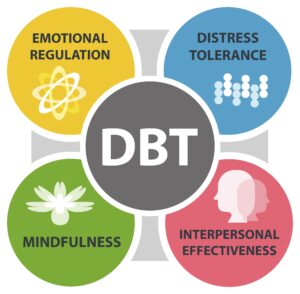The Importance of LGBTQIA+ Affirming Mental Healthcare

In most—if not all—fields of healthcare, LGBTQIA+ people are stigmatized and discriminated against. For the health and wellbeing of those in the LGBTQIA+ community, affirming healthcare is necessary for better health outcomes for all.
When it comes to mental healthcare, “LGBTQIA+ inclusive mental health care is about building a community safety net for folks to be seen, heard, and affirmed. It is about creating a society different from the one we learned. A society that values difference, adaptability, and community support and engagement,” says Emily R. Dunn, LMSW, associate therapist and group therapy facilitator at Valera Health.
Mental Health Risks for the LGBTQIA+ Community
Due to our heteronormative and discriminative society, the LGBTQIA+ community is at an increased risk when it comes to mental health outcomes
As stated by the National Alliance on Mental Illness (NAMI) “…There is strong evidence from recent research that members of [the LGBTQIA+ community] are at a higher risk for experiencing mental health conditions — especially depression and anxiety disorders. LGBT+ adults are more than twice as likely as heterosexual adults to experience a mental health condition. Transgender individuals are nearly four times as likely as cisgender individuals individuals to experience a mental health condition.”
Harrowing facts by Mental Health America (MHA) about LGBTQIA+ mental health outcomes include:
- Over 39%, or nearly 5.8 million, of those who identify as lesbian, gay or bisexual have reported having a mental illness in the past year.
- LGBTQ+ teens are six times more likely to experience symptoms of depression than non-LGBTQ+ identifying teens.
- LGBTQ+ youth are more than twice as likely to feel suicidal and over four times as likely to attempt suicide compared to heterosexual youth.
- 48% of transgender adults have reported that the have considered suicide in the past year, compared to 4% of the overall U.S. population.
According to the same article, in a survey of LGBTQIA+ people over half of survey respondents said they have experienced healthcare providers denying them care, providers using offensive/demeaning language, or providers blaming sexual orientation or gender identity as the cause for a patient’s illness. Due to the fear of these experiences, some LGBTQIA+ people completely avoid getting needed healthcare services.

What LGBTQIA+ Affirming Therapy Looks Like
The American Association for Marriage and Family Therapy (AAMFT) defines affirmative therapy as “…an approach to therapy that embraces a positive view of Lesbian, Gay,
Bisexual, Transgender, and Queer (LGBTQ) identities and relationships and addresses the negative influences that homophobia, transphobia, and heterosexism have on the lives of LGBTQ clients.”
This therapeutic framework creates a safe, supportive and non-judgemental space for individuals who identify as LGBTQIA+. Core principles of LGBTQIA+ affirmative therapy are acceptance, respect and validation. LGBTQIA+ affirmative therapy doesn’t shy away from heterosexism, discrimination against transgender people and those who identify as non-binary, and addresses the impact that discrimination has on the mental well being of the LGBTQIA+ community as well as celebrates diversity.
Intended outcomes of LGBTQIA+ affirmative therapy are to empower individuals, address systemic barriers, and facilitate personal growth and self-acceptance.

Valera Health Provides LGBTQIA+ Affirming Mental Healthcare
At Valera Health, we believe in inclusive and accessible telemental healthcare for all. Around 1 ⁄ 3 of our New York providers and either specialized in LGBTQIA+ affirmative care, and/or identify as LGBTQIA+ themselves, including virtual therapy, group therapy, psychiatry, medication management and more. Valera Health services are available in 13 languages for those ages 6 and up.
We’re happy to announce the launch of our LGBTQIA+ therapy and support group for adults ages 18+.
The anticipated start date for this group is June 12th, 2023. Currently, this group is only open to current Valera Health patients, however based upon interest we plan on expanding this group to those who are not currently a patient with Valera Health. For current Valera Health patients who would like to join the LGBTQIA+ group, we encourage you to speak to your current provider to learn more or sign-up for the group.
“This group is a collaborative, community-building, and peer therapist-led group of LGBTQIA+ adults who identify anywhere on the gender identity or sexual orientation spectrum, specifically supporting individuals who are under the queer umbrella.” says Emily R. Dunn, LMSW, and facilitator of the LGBTQIA+ group.
“We will focus on topics such as coming out, late bloomers, navigating healthy relationships, communicating with family, building community, queer parenting, accessing gender-affirming care, kinks and non-monogamous relationships. While sessions will be structured around a topic, the group will be drop-in style and serve as support for queer and gender expansive individuals.”
If you are interested in joining future sessions of the group—or interested in individual therapy—but are not a current Valera Health patient, you can schedule a free consultation with a dedicated Health Connector using this form or by calling 646-450-7748.
On the form, make sure to select “group therapy” or mention this when calling the Health Connector hotline. Currently, this group is only offered for those residing in the state of New York, however we plan to expand our group therapy offerings to more states in the near future—stay tuned!




























